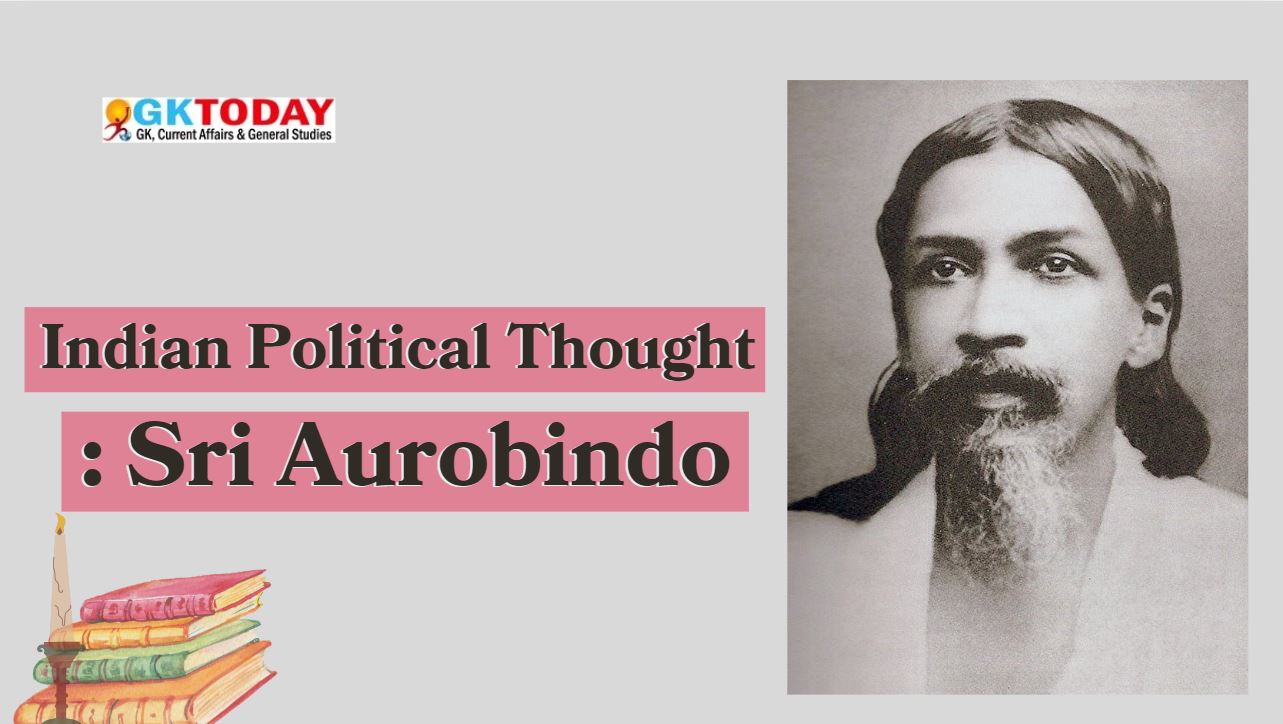Indian Political Thought: Sri Aurobindo
Sri Aurobindo Ghose, commonly known as Sri Aurobindo, was a prominent Indian philosopher, nationalist leader, yogi, and poet. Born on August 15, 1872, in Kolkata, he deeply influenced Indian political thought and spirituality. His works and teachings continue to resonate in contemporary discussions on nationalism, spirituality, and human evolution.
Biographical Overview
Sri Aurobindo was born into a Bengali family. His early education took place in Kolkata and later in England, where he attended St. Paul’s School and King’s College, Cambridge. Initially, he joined the Indian Civil Service but soon shifted his focus to nationalism. His political activism during the struggle for Indian independence marked the beginning of his journey as a public figure. Later, he became deeply involved in spiritual practices and philosophy.
Philosophical Contributions
Sri Aurobindo’s philosophical contributions are and multifaceted.
Integral Yoga
Integral Yoga is a spiritual practice that aims to transform human nature into divine nature. It integrates various aspects of life, including physical, mental, and spiritual dimensions.
Spiritual Evolution
He proposed that humanity is on a path of spiritual evolution, striving to reach higher states of consciousness. This evolution is not only individual but collective.
Supermind
The concept of Supermind represents a higher consciousness that transcends ordinary mental faculties. It is crucial for achieving spiritual evolution.
Political Thought
Sri Aurobindo’s political thought was deeply intertwined with his spiritual beliefs.
Nationalism
He was a strong advocate for Indian independence from British rule. His vision of nationalism emphasised self-governance and cultural revival.
Spiritual Nationalism
Sri Aurobindo believed that India’s freedom should stem from spiritual awakening. He argued that a cultural renaissance was essential for true independence.
Critique of Western Materialism
He critiqued Western civilisation for its materialistic approach and lack of spiritual depth. He argued for a balance between material and spiritual pursuits.
Key Works
Sri Aurobindo authored several influential works that explore his philosophical and political ideas.
The Life Divine
This book delves into the nature of reality and the evolution of consciousness. It is considered one of his seminal works.
Savitri
An epic poem, Savitri integrates themes of love, death, and the divine. It reflects his spiritual insights and poetic prowess.
Essays on the Gita
In this work, he interprets the Bhagavad Gita, denoting its spiritual and philosophical dimensions. He connects its teachings to contemporary issues.
The Ideal of Human Unity
This essay discusses the need for unity among nations and cultures. It advocates for a collective spiritual evolution.
Influence and Legacy
Sri Aurobindo’s influence extends beyond his lifetime.
Cultural Revival
He played a very important role in reviving Indian culture and spirituality. His teachings inspired a generation of thinkers and activists.
Auroville
In 1968, he founded Auroville, an experimental township aimed at promoting human unity and sustainable living. It embodies his vision of a harmonious society.
Sri Aurobindo Ashram
Established in Puducherry, the ashram serves as a centre for spiritual practice and education. It attracts seekers from around the world.
Key Concepts
Several key concepts are central to Sri Aurobindo’s philosophy.
Divine Life
He believed that life should manifest the divine essence. This idea encourages individuals to strive for a higher purpose.
Transformation of Society
Sri Aurobindo asserted that societal change must accompany spiritual transformation. He envisioned a world where spirituality guides social progress.
Unity of Existence
He emphasised the interconnectedness of all beings and the universe. This concept encourages a sense of universal brotherhood.
Criticism and Controversies
Despite his contributions, Sri Aurobindo faced criticism.
Political Engagement
Some critics questioned his shift from active politics to spiritual pursuits. They argued that he abandoned the political struggle for independence.
Interpretation of Indian Culture
Debates continue regarding his interpretations of Indian philosophy and spirituality. Some scholars argue he oversimplified complex traditions.
Philosophical Influences
Sri Aurobindo’s thought was shaped by various philosophical traditions.
Vedanta
His ideas were influenced by traditional Indian philosophies, particularly Vedanta and Yoga. These frameworks provided a foundation for his spiritual practices.
Western Philosophers
He engaged with Western thinkers like Hegel and Nietzsche. Their ideas contributed to his understanding of evolution and consciousness.
Spiritual Practices
Sri Aurobindo emphasised the importance of spiritual practices.
Meditation
Meditation is central to his teachings. It focuses on inner transformation and connecting with higher consciousness.
Sadhana
Sadhana refers to disciplined spiritual exercises aimed at achieving higher states of awareness. It is essential for personal growth and development.
Cultural Icon
Sri Aurobindo is recognised as a key figure in the Indian Renaissance and spiritual movement. His contributions to Indian political thought and philosophy are deep and his vision of a spiritually awakened society remains relevant .


